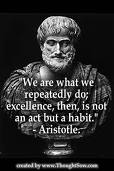Uncategorized
Integrity and Personal Responsibility
 Our word, integrity, is an almost exact transliteration of the Latin word, integritas, which means “undiminished condition, completeness, soundness, blamelessness.”
Our word, integrity, is an almost exact transliteration of the Latin word, integritas, which means “undiminished condition, completeness, soundness, blamelessness.”
Many people today do not connect the word “integrity” with “leadership” today because of wide gaps between the two in many leaders in business and government.
Accepting Personal Responsibility–a Fundamental for Leaders

 President Harry Truman had this on his desk: “The Buck Stops Here.” Today, our nation is filled with buck-passers, those who want no accountability for bad decisions or wrongful actions. To keep integrity intact, make every decision with care.
President Harry Truman had this on his desk: “The Buck Stops Here.” Today, our nation is filled with buck-passers, those who want no accountability for bad decisions or wrongful actions. To keep integrity intact, make every decision with care.
Why should this high level of integrity matter? Just as you want to trust others in your life, you must prove yourself trustworthy if they are to put trust in you. Having integrity is the foundation for building a circle of trust.
You know you cannot trust everyone in your business or workplace, as if all had your best interests at heart. That’s just the way life is. Some people were not raised well. Others are driven by sick minds. Still others are driven by career goals, regardless of whom they hurt along the way.
 Nevertheless, when you keep your integrity intact, you will find at least two effects on others. (1) Those who have integrity will be drawn to you. (2) Those who do not have it either will seek to learn from you, or will avoid you. An old proverb says, “A cord of three strands is not easily broken.” You need alliances with people of integrity, to make a circle of trust to fend off the sharks in the water. Integrity has this benefit.
Nevertheless, when you keep your integrity intact, you will find at least two effects on others. (1) Those who have integrity will be drawn to you. (2) Those who do not have it either will seek to learn from you, or will avoid you. An old proverb says, “A cord of three strands is not easily broken.” You need alliances with people of integrity, to make a circle of trust to fend off the sharks in the water. Integrity has this benefit.
Work and Integrity
 Part of integrity is giving 100% when others are not doing so. Why should we do this? If they are being paid the same, or more, yet doing less, is this not unjust and a negative motivation to do all we can?
Part of integrity is giving 100% when others are not doing so. Why should we do this? If they are being paid the same, or more, yet doing less, is this not unjust and a negative motivation to do all we can?
Integrity is wholeness of character. Others who cheat their employers through substandard performance are lying, cheating, and stealing–all at once.
 Your work performance is a direct extension of your character. What you do at work is a reflection of your own decision, either to give your best or not. Every day, this is a private, personal decision that is reflected by what you produce.
Your work performance is a direct extension of your character. What you do at work is a reflection of your own decision, either to give your best or not. Every day, this is a private, personal decision that is reflected by what you produce.
Our U.S. military academies have this code of ethics in common. Lying, cheating, and stealing, can occur in a thousand ways. Always giving 100% at work is your statement you are driven for excellence, on principle.
Honesty and Integrity
Abraham Maslow taught that honesty and openness to facts were traits of psychologically mature and healthy people. Based on what we are seeing today–and in fact what we have seen for many decades–there are many leaders in the United States who are neither psychologically mature nor ethically healthy.
 Blame, excuses, and deceptions to cover errors or malfeasance, are quite common among leaders today. This is because their self-interest has replaced mirrors in their ethical glasses. When they decide and act, they are looking at themselves.
Blame, excuses, and deceptions to cover errors or malfeasance, are quite common among leaders today. This is because their self-interest has replaced mirrors in their ethical glasses. When they decide and act, they are looking at themselves.
Integrity–wholeness in seeing–requires ethical lenses clear and well-ground through moral decision-making on a daily basis. You cannot act otherwise when you are honest.
 The picture to the right can be taken two ways: as self-deception, or an honest look at the heart within. One of the great facts about integrity is that, over time, it is revealed clearly to others. Your personality may be timid. But your moral choices add up day after day. Your honest inner core must be revealed because you operate from within, not superficial devices to “spin” who you are.
The picture to the right can be taken two ways: as self-deception, or an honest look at the heart within. One of the great facts about integrity is that, over time, it is revealed clearly to others. Your personality may be timid. But your moral choices add up day after day. Your honest inner core must be revealed because you operate from within, not superficial devices to “spin” who you are.
Seeing with honesty means you have the power to cultivate integrity.
Happiness and Integrity
 Aristotle’s statement is true. Moral excellence, moral integrity, comes through repetition. One of the reasons so many people are unhappy is they are seeking meaning through the approval of others, or seeking life goals that cannot be met, or goals that cannot give deep inner satisfaction.
Aristotle’s statement is true. Moral excellence, moral integrity, comes through repetition. One of the reasons so many people are unhappy is they are seeking meaning through the approval of others, or seeking life goals that cannot be met, or goals that cannot give deep inner satisfaction.
Do you have a taste for sweets or chocolate? Did you ever taste a vegetable, filled with vitamins, you did not like? These analogies are useful for our thinking on the value of integrity and its relationship to happiness. Diabetes and fat plague our population. Why? People like sweets. They do not like to sweat. So feeding themselves on what they like, make themselves unhealthy, and become unhappy with the results.
How many people drink too much, take pills to sleep, go to therapists, and more, because they do not like the persons they are? If you have become someone you do not really like, a person you fear to see truly in the mirror, then get off your “sugar high” of moral shortcuts. Start, one decision at a time, to do the right thing for the right reason. Perhaps you need to make the risks small, so you will do this. But the long-term effects of moral habit eventually make you morally stronger. You begin to have backbone again.
Integrity does not come cheap. It requires daily attention. It begins with baby steps of right moral choice. But a few decisions practiced soon begin to build our moral fiber. And with that comes the inner peace and satisfaction of knowing we are good people in fact, not belief or representation.
 One of the greatest benefits of integrity is happiness when you are with those you love. Whether you have young or grown children, when you speak from integrity:
One of the greatest benefits of integrity is happiness when you are with those you love. Whether you have young or grown children, when you speak from integrity:
- They know you have it
- They listen with respect
- They want to model what they see in you
Life is short enough. Sometimes it can be shorter than we think or expect. By cultivating your personal moral integrity, disability and death never will catch you off-guard. Your flight path will be established and clear. Your loved ones will not have to mince or make up words about who you were, because your character and integrity will live after you.
That knowledge will be a source of happiness for you, something more precious than gold. To have the respect of those who know us best is 24K gold happiness. We surely want to have the respect of our coworkers, subordinates, and superiors. Yet our inner circles of family and friends are the people who will remember us when life is over.
A Little Research Assignment
The Bible has a number of very important and provocative statements about integrity. You are invited to consult the following references in the Bible. Integrity has been a concern for thousands of years! Psalm 15 (verse 2); Psalm 26 (verses 1 & 11); Psalm 41 (verse 12); Proverbs 2:6-7; Proverbs 10:9; Proverbs 11:3; Proverbs 19:1; Proverbs 20:7; Proverbs 28:6. Some Bible translations may not use the word, “integrity,” but most do. Enjoy this little adventure!